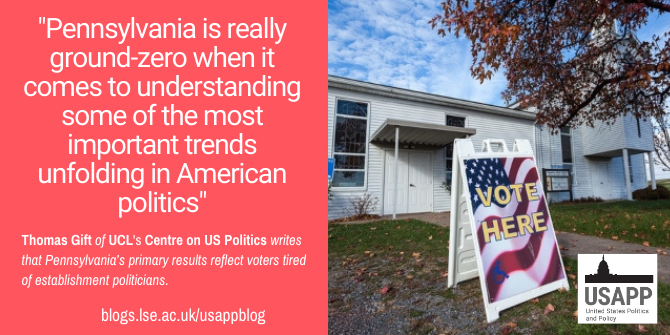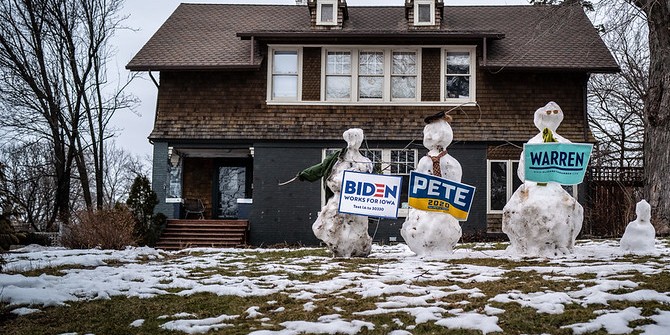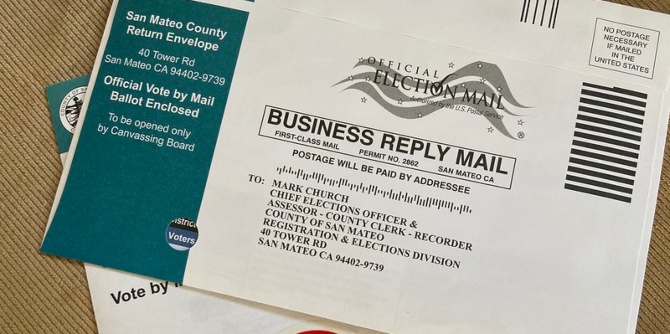 Several states across the US held primaries on Tuesday, but perhaps none was more closely watched — or garnered more media attention — than the elections held in Pennsylvania. In this Q&A, Thomas Gift, a native of the Keystone State, explains why Pennsylvania is a bellwether for national politics and why all eyes should be on it to understand what could happen in elections in 2022, 2024, and beyond.
Several states across the US held primaries on Tuesday, but perhaps none was more closely watched — or garnered more media attention — than the elections held in Pennsylvania. In this Q&A, Thomas Gift, a native of the Keystone State, explains why Pennsylvania is a bellwether for national politics and why all eyes should be on it to understand what could happen in elections in 2022, 2024, and beyond.
You’re from Pennsylvania originally. What should those not familiar with the state know about its politics?
The joke about Pennsylvania (attributed to Democratic strategist James Carville) is that it’s “Pittsburgh, Philadelphia, and Alabama in between.” As with the rest of the country, urban areas tend to lean heavily Democratic, whereas the large rural part of the state is predominantly Republican. As a “purple” state, “PA” (as we call it) is often seen as a bellwether for where the country is heading politically. In 2016, the state voted for Donald Trump, but in 2020, it tipped for Joe Biden. Recently, it’s also been at the center of controversies surrounding Trump’s baseless claims of vote-rigging. To my mind, Pennsylvania is really ground-zero when it comes to understanding some of the most important trends unfolding in American politics, including polarization, distrust in Washington, and the relentless pull of Trumpism. That’s why Tuesday’s primaries were so revealing.
You spent the last month on the ground in PA closely watching the primaries. What was your impression going into Tuesday?
First off, a confession: I’m from the “Alabama” part of PA — a small, overwhelmingly Republican town (Chambersburg) in the south-central part of the state — so I admit my perspective is a bit skewed. But at least here, what strikes me most is the extent to which Trumpism is still the only game in town. It’s impossible not to recognize the continued enthusiasm for MAGA. “America First” signs are everywhere. Trump flags dot countless houses. Just a couple blocks from where I’m staying, you can see an array of (let’s call it “aggressive”) home decor, from messages of “F&*k Biden” to “Trump 2024: He’ll Be Back.” “Trump 2020: The Sequel” is a favorite bumper sticker in the area. Anywhere you look, it seems like Republican voters are gearing up for a fight — not only for 2022, but also 2024.
Let’s talk about some specific races. First, what’s happening with the contested Republican primary race for Senate?
Currently, the race is still too close to call between former TV celebrity doctor Mehmet Oz and former hedge fund CEO Dave McCormick. No one’s surprised the battle has come down to the wire and could result in a recount. Polls predicted a close race, and the amount of money and attention funneled into the contest reflect its importance on the national scale. Oz earned Trump’s coveted endorsement, but the reality is that the whole race has been about which candidate can “out-Trump” the other. That’s even true of McCormick — the buttoned up, so-called “moderate” — who’s run ads with motorcyclists (replete with black leather jackets and bandanas) behind him proudly brandishing Trump flags. The third-place candidate in the race was “ultra-MAGA” Kathy Barnette, who’s been a far-right flamethrower throughout the primaries.
On the Democratic side, the Senate primary race was much more lopsided. What happened there?
PA Lieutenant Governor John Fetterman, a 6’9″ Harvard graduate with a propensity for sporting black hoodies and oversized basketball shorts (and who also suffered a stroke just days before the election), came out on top – easily. He beat Conor Lamb, a middle-of-the-road, pragmatic US Congressman with a sterling (and much more traditional) resume. Fetterman might be the most intriguing candidate that Pennsylvania (and the country) has seen in a while. He doesn’t look like a “typical” politician, but his working-class, unpretentious “vibes” clearly resonated with liberal voters. Despite endorsing Bernie Sanders and aligning himself (mostly) with the progressive wing of the Democratic Party, he’s also taken more centrist positions on certain issues, such as supporting fracking in PA (a huge issue in the state that irks environmentalists).

“20131105-092315” (CC BY-NC 2.0) by weaverphoto
Who won the gubernatorial primaries in Pennsylvania?
As evidence of Trump’s dominance in Pennsylvania, GOP candidate Doug Mastriano (who happens to be from my home district, Franklin County) cleaned up on Tuesday. He’s a far-right Republican — the “QAnon Dad” — who’s trafficked in conspiracy theories, attended the January 6th rally in DC, and arguably done more than anyone in PA to peddle Trump’s false claims of election fraud in 2020. He’s also a strong anti-abortion advocate. Although many experts predict that Mastriano is too right-wing to win in a general election, I’m not fully convinced. His competition in November will be Pennsylvania Attorney General Josh Shapiro, who emerged from an unchallenged primary. Shapiro will be a formidable opponent. He boasts a long record of accomplishments in Pennsylvania politics and is broadly popular with Democrats across-the-board.
What’s the main lesson from the PA primaries?
With some notable exceptions, Pennsylvanians appear tired of “establishment” politicians. Especially on the Republican side, it’s clearly impossible to run as an anti-Trump candidate and expect to win. While spending time in a heavily Republican area the last month might be coloring my perspective, it feels to me like the energy among GOP voters is stronger than for Democrats (a point reflected in much higher increases in Republican voter turnout on Tuesday). A lot still can happen between now and the midterms, but given national trends showing Biden’s unpopularity — combined with the fact that the party out of power historically does poorly in off-year elections — I’d be surprised if PA is a state where Republicans don’t perform well. That said, the looming debate over Roe v. Wade could still throw a wrench into some races.
Please read our comments policy before commenting.
Note: This article gives the views of the author, and not the position of USAPP – American Politics and Policy, nor the London School of Economics.
Shortened URL for this post: https://bit.ly/3LpJcx3
About the author
 Thomas Gift – UCL
Thomas Gift – UCL
Thomas Gift is Associate Professor of Political Science at UCL, where he is director of the Centre on US Politics (CUSP).






